With every election comes the opportunity to establish a renewed vision for our community: this election is no different. Voters in the November 7 general election are tasked with electing citywide leadership, including the Seattle Mayor and two citywide Seattle City Council seats, and three of the five Port of Seattle Commission seats.
The Urbanist Elections Board evaluated eight eligible candidates for endorsement for Port of Seattle, Seattle City Council, and Mayor of Seattle. We also considered the King County Veterans and Human Services Levy. From this pool, we have endorsed five leaders who both share our urbanist values and have presented clear plans to enact those values into tangible policies. We are proud to present our 2017 general election endorsements.
Mayor of Seattle: Cary Moon
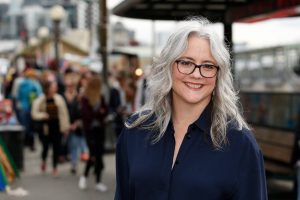
We endorsed Cary Moon in the primary, and we couldn’t be more excited to carry that over to the general and see her in office.
As a urban planner with decades of experience, she understands urbanist concerns far better than her opponent, Jenny Durkan. At the Growing Seattle Forum, Moon expertly answered the Vision Zero and mode hierarchy questions, putting people walking and biking at the top of her list, whereas Durkan put pedestrians last on her list. While this may seem academic, the rankings are a solid indication if increasing safety for the most vulnerable street users will be a priority for a candidate. Durkan seemed more interested in the car-centric status quo.
Moon would go to bat for municipal broadband while all indications are that Durkan would not. Moon has been adamant about using legal tools at the city’s disposal to curb the increase in housing speculation that is contributing to higher prices in Seattle. Durkan has made attempts to smear those ideas before eventually coming around on them. Moon champions missing middle housing types in single-family zones while Durkan has signaled that she is much more hesitant to touch sanctified bungalow-land, as we pointed out earlier in the election season.
Moon has a strong platform on public transit. While every candidate promised to speed up the delivery of Seattle’s Sound Transit 3 projects, Moon uniquely came forward with a funding source, pledging to look into using municipal bonding to start construction faster, as Seattle Subway has proposed. Streamlining process and permitting can only go so far if Sound Transit doesn’t have enough money in the bank to bid out the contracts and begin building the lines.
We trust Moon to get busses moving by fighting to add dedicated lanes, queue jumps, and signal priority. We also trust her to take on safe infrastructure for pedestrians and people on bikes as a major priority.
Rather than strengthen her own transit plans, Durkan has sought to draw attention to Moon’s husband as a potential source of conflict of interest in serving on the Sound Transit Board. Moon’s husband is an architect at a firm with a few Sound Transit contracts. We don’t buy Durkan’s scare tactic. Moon may have to recuse herself on issues that directly pertain to her husband’s work, but we’d rather have Moon representing Seattle’s light rail interests knowing she may have recuse herself once in a blue moon rather than a full-time Durkan.
Moon will bring a collaborative style to bear on the many problems facing Seattle. While some have criticized Moon for calling for more community outreach as we carry HALA forward, we believe Moon would be much better at listening to legitimate concerns and selling the much-needed zoning changes than either Mayor Ed Murray was or Durkan would be.
Don’t miss this golden opportunity to put an inspiring urbanist in office. Vote Moon. Scream it from the mountaintops.
Read Cary Moon’s questionnaire.
Seattle City Council, Position 8: Teresa Mosqueda
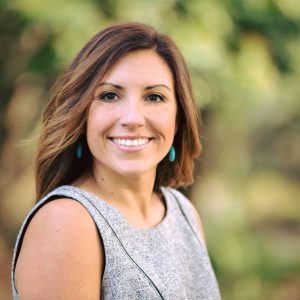
The Urbanist is retaining our primary endorsement of Teresa Mosqueda and asking you to give her your vote again in the general election. In our primary endorsement we emphasized many of her strengths. Mosqueda’s professional background is in social justice, labor, and public health, and she’s quickly adopted detailed urbanist positions such as expediting Sound Transit 3 and unequivocally supporting dense housing types in single-family zones. She also easily drops urbanist catnip on the campaign trail, highlighting the value of things like Barcelona’s superblocks. Further, Mosqueda’s lived experience as a woman of color and a renter would add critical perspectives to the council. While 42% of Seattleites rent, the council currently has no renters.
Many urbanists have outright repulsion for Jon Grant, Mosqueda’s opponent. It’s hard not to characterize that repulsion as over-the-top. In some instances, it gives urbanism a bad name. The urbanist political movement needs grassroots tenant advocacy and should be more influenced by renters than developers. However, some aspects of Grant’s platform pose a real risk to urbanism. Grant’s speaking truth-to-power is muted when it comes to wealthy homeowners that continually stand in the way of needed changes, such as single-family rezoning and street improvements. Seattle’s housing, transportation, and safe streets needs all hinge on creating a coalition that overcomes wealthy landowners seeking to maintain the status quo. Urbanism needs candidates that will hold the powerful accountable and that starts with landowners.
Mosqueda’s support is also remarkably broad. She has won endorsements from nearly all Seattle’s labor organizations, most notable elected officials, and a number of urbanist advocacy groups, including Transportation for Washington, Washington Bikes and Seattle Subway. These and other factors have resulted in people lobbing the label establishment at Mosqueda, even though she received the critical non-endorsement from The Seattle Times, whose editorial board likely supported Jon Grant to further its agenda of single-family preservation.
Overall we believe Mosqueda will be able to stand up to backlash on critical urbanist issues because her support is broad and deep. We also believe her lived experience brings the values we need in electeds to push for even more ambitious housing, transportation and land use changes. Mosqueda is an exceptional candidate and The Urbanist strongly encourages you to vote for her. Vote Mosqueda.
Read Teresa Mosqueda’s questionnaire.
Kate Brunette, a member of the Elections Board, recused herself from this race due to her role as campaign manager for Jon Grant, an eligible candidate in this race.
Seattle City Council, Position 9: Lorena González
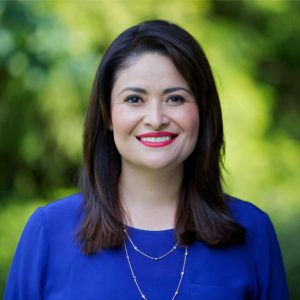
After endorsing her in 2015 and in this year’s primary, The Urbanist supports incumbent Lorena González for Seattle City Council Position 9 (at-large) in the general election. In her nearly two years in office she’s demonstrated a grasp of major policy issues and has sponsored key pieces of legislation for a more affordable and equitable city.
In her questionnaire, González noted her personal experience is helping her lead: “The city has much more work ahead of it to continue strategically planning our urban footprint and, as the second youngest person on council and one of two who relies on public transportation, my perspective on these issues is necessary to advance the city in its planning goals.”
On transportation, González is willing to use city resources to speed construction of Sound Transit 3 projects and to further incentivize carpooling, ridesharing, and transit use. One nuanced policy position she discussed in the interview is her preference for transportation impact fees rather than a possible congestion fee. She is fully supportive of Vision Zero and building a complete bicycle network.
Having worked as a civil rights attorney and serving as President of the Latina/o Bar Association of Washington, she has a strong interest in equity-based solutions to homeless and the housing affordability crisis. “I continue to believe that the city and its housed and unhoused residents remain best served by evidence-based, people-centered strategies that are widely believed to effectively move people from outside to inside,” she said. “I will continue to ask questions about any policy that falls short of that principle.”
She has consistently supported the Mandatory Housing Affordability program. She is a strong supporter of increasing density in transit-served neighborhoods, and is open to revisiting the opportunity for missing middle housing in single-family residential zones. She has sponsored council legislation that will invest in new housing on publicly-owned land and has directed city staff to refine strategies for creating housing welcoming and affordable to the LGBTQ community. During her short time in office she has taken the lead on moving towards real police reform.
Her challenger, Pat Murakami, has not matched González’s civic experience nor made a convincing case to unseat her after less than two years in office. By the way, Murakami proposes to raise Seattle’s inclusionary requirement to 30%, seemingly in a bid to stifle growth. We are proud to continue supporting Lorena González in Position 9 and look forward to seeing her make strides on important urbanist policies. Vote González.
Read Lorena González’s questionnaire.
Port of Seattle Commission, Position 1: Ryan Calkins
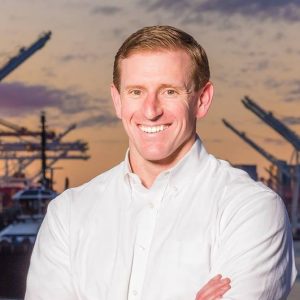
Port commissioners might not sound like exciting races, but they exercise considerable power and influence both directly–overseeing the ninth busiest airport and the fourth busiest seaport in the country–and indirectly with their influence on transportation policy. The Port of Seattle has an annual budget of $650 million and is one of the largest landowners in the region. The leadership of the port has enormous impacts for the entire region.
In the primary, The Urbanist endorsed Ryan Calkins for Port Commissioner Position 1, and, fortunately, he made it through the primary. We’re proudly maintaining that endorsement. Calkins has appropriate business experience (he works at a nonprofit that supports low-income entrepreneurs as they start and grow their businesses) and shows a real willingness to make the Port of Seattle an organization that advances the public’s values, rather than narrowly advancing business interests.
The case for voting Calkins has grown even stronger since the primary. His list of endorsements is powerful. It includes The Stranger, Seattlish, The Seattle Weekly, the Seattle Sierra Club chapter, many local unions, Seattle Councilmembers Mike O’Brien, Debora Juarez, and Lorena González, and he received the key non-endorsement from The Seattle Times.
Calkins endorsement from the Sierra Club is especially important because he’s running as an environmentalists against a candidate that has been rightly criticized for supporting the Shell arctic oil rig. Calkins has called on the port to strengthen ties to LGBTQ businesses, an effort that would promote our ideals of inclusion and reinforces his previous claims that the Port of Seattle should be a public servant.
Calkins would be a breath of fresh air since his opponent, John Creighton, that has held his seat for over 10 years. During his opponent’s tenure, the Port of Seattle has not only had scandals but also promoted many anti-urban solutions, such as the Puget Sound Gateway Project and the Alaska Way Viaduct replacement tunnel. Calkins understands the power the port can leverage for the public benefit and sees the connections between its interest and a more prosperous and sustainable region. Vote Calkins.
Read Ryan Calkins’ questionnaire.
Port of Seattle Commission, Position 4: Preeti Shridhar
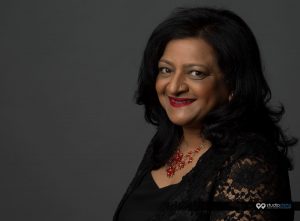
The Urbanist is excited to endorse Preeti Shridhar for Port Commissioner Position 4. Shridhar brings a strong commitment to equity and sustainability at the Port of Seattle.
It is clear that Shridhar would focus on equity as Port Commissioner. In her interview, she repeatedly highlighted the growing immigrant communities in South King County and discussed job programs and small business incubation in South King. She also spoke at the protests at Sea-Tac following Trump’s Muslim ban. As Port Commissioner, she would ensure that freedom of expression is protected and provide oversight of the Port of Seattle Police Department.
Shridhar’s opponent is Peter Steinbrueck, a former Seattle city councilmember. Steinbrueck has lobbied against upzones and other proposals in HALA. In contrast, Shridhar wants to ensure that port workers can live close to where they work. Shridhar brings the right experience in regional partnerships and working with local governments to increase affordable housing options for port workers.
Additionally, while both Shridhar and Steinbrueck want to focus on environmental sustainability, Shridhar’s positions stand out. She wants to reduce the carbon footprint of the port by investing in biofuels for airplanes and converting cargo drayage trucks to natural gas. Shridhar is open to tolling Sea-Tac’s airport drive to reduce congestion and fund alternatives and also is willing to go on the record to oppose Port of Seattle funding for car-only transportation investments.
We feel that Shridhar’s environmental background combined with her commitment to bringing jobs and small business opportunities to the South King County community make her uniquely qualified to serve as Port Commissioner. Vote Shridhar.
Read Preeti Shridhar’s questionnaire.
King County Proposition 1 (Veterans and Human Services Levy): Approve
It’s shameful that anyone in our wealthy county is unsheltered. It’s doubly shameful that anyone who sacrificed to serve our country goes unsheltered. This is a solvable problem and the Veterans and Human Services Levy is a step in the right direction. The Urbanist strongly recommends a ‘yes’ vote on the ballot measure.
The tax is a small increase falling mostly on wealthier folks. The levy will add an additional five cents for every $1,000 of property value compared to the current levy, which expires in December, and will generate up to $51 million per year. For families that have around $650,000 of wealth in their homes, they will be asked to pay about about $65 a year. The current much smaller levy only raises about $18 million a year but has been documented as saving the county money over $7 million on emergency medical and criminal justice costs.
The money has also been well managed. There are regular oversight committee meetings and the county has extensive documentation on the impacts and who the money services. For example, in 2015 it helped over 1,000 people access or remain in stable housing. If this levy isn’t passed, all families that are served will have those services cutoff.
Passing the levy will directly impact many lives in a dramatically positive way. The Urbanist implores you to vote ‘yes’ on the Veterans and Human Services Levy.
Voting members of the Elections Board consisted of Scott Bonjukian, Kate Brunette, Ben Crowther, Aleksandra Culver, Alex Hudson, Ryan Packer, Owen Pickford, and Doug Trumm.

Elections Committee
The Urbanist was founded in 2014 to examine and influence urban policies. We believe cities provide unique opportunities for addressing many of the most challenging social, environmental, and economic problems. We serve as a resource for promoting urbanism, increasing political participation, and improving the places we live. The Elections Committee consists of community volunteers and staff members of The Urbanist and is a standing body representing the political values of our organization.

